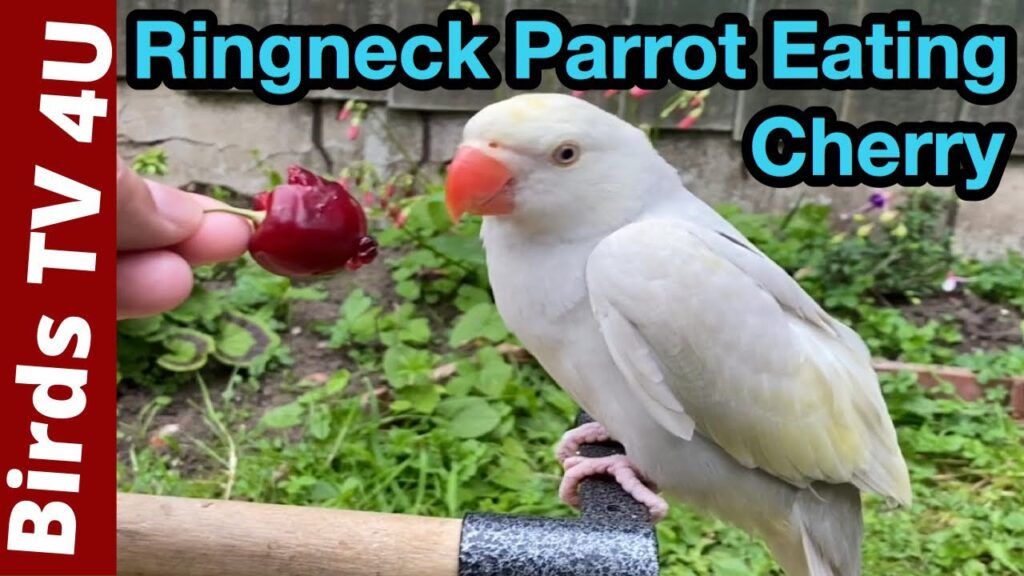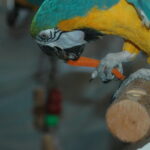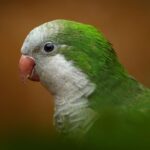Yes, parrots can eat cherries. Remove the pits before feeding them to prevent choking hazards.
Parrots enjoy a variety of fruits, and cherries can be a delightful treat. Always ensure cherries are fresh and free from pesticides. Wash them thoroughly before serving. Remove the pits to avoid choking risks and potential toxicity. Cherries provide essential vitamins and antioxidants beneficial for a parrot’s health.
They offer natural sweetness and hydration. Moderation is key; too many cherries can lead to digestive issues. Rotate cherries with other fruits to maintain a balanced diet. Watch for any allergic reactions or changes in behavior. Always consult an avian vet for tailored dietary advice. Keeping your parrot’s diet varied and safe ensures their overall well-being.
Introduction To Parrot Diets
Parrots are beautiful, intelligent birds that require a balanced diet. Feeding your parrot the right foods ensures a long, healthy life. Knowing what to feed your parrot is crucial for their well-being.
Common Foods For Parrots
Parrots enjoy a variety of foods. Here are some common choices:
- Fruits
- Vegetables
- Nuts
- Seeds
- Pellets
Fruits and vegetables should make up most of their diet. Parrots love apples, grapes, and carrots. Nuts and seeds are tasty treats but high in fat. Pellets provide essential nutrients but should not be the only food.
Nutritional Needs
Parrots need a balanced diet to thrive. Key nutrients include:
| Nutrient | Importance |
|---|---|
| Proteins | Builds and repairs tissues |
| Vitamins | Boosts the immune system |
| Minerals | Supports bone health |
| Fats | Provides energy |
Ensure your parrot gets a variety of foods to meet these needs. A mix of fresh fruits, veggies, and pellets works best. Avoid feeding them junk food or anything harmful.
Cherry Nutrition Facts
Cherries are not just delicious; they are packed with nutrients. Parrots can benefit from these nutrients. Let’s explore what cherries offer.
Vitamins And Minerals
Cherries are rich in essential vitamins and minerals. They provide a good amount of:
- Vitamin A: Helps with vision and immune function.
- Vitamin C: Boosts immune health and aids in tissue repair.
- Potassium: Supports heart health and muscle function.
- Calcium: Important for bone health and muscle function.
- Magnesium: Helps with muscle and nerve function.
Here’s a table summarizing the nutritional content of cherries per 100 grams:
| Nutrient | Amount |
|---|---|
| Vitamin A | 64 IU |
| Vitamin C | 7 mg |
| Potassium | 222 mg |
| Calcium | 13 mg |
| Magnesium | 11 mg |
Health Benefits
Cherries offer several health benefits to parrots:
- Boosts Immunity: Vitamins A and C strengthen the immune system.
- Promotes Heart Health: Potassium helps maintain a healthy heart.
- Supports Bone Health: Calcium and magnesium are crucial for strong bones.
- Enhances Vision: Vitamin A is essential for good eyesight.
- Improves Muscle Function: Potassium and magnesium aid in muscle function.
Feeding cherries to parrots can improve their overall health. Ensure you remove the pits before offering them to your feathered friend.
Are Cherries Safe For Parrots?
Parrots are curious creatures, often exploring new foods. As pet owners, we must ensure their diet is safe. Cherries are a popular fruit, but are they safe for parrots?
Potential Risks
Cherries contain pits, which are harmful to parrots. The pits have cyanide, a toxic substance. Eating these can cause serious health issues.
Here are some potential risks:
- Choking hazard
- Cyanide poisoning
- Digestive problems
Safe Serving Practices
To safely serve cherries to parrots, follow these steps:
- Remove the pits
- Wash the cherries thoroughly
- Cut them into small pieces
Here is a quick table for reference:
| Step | Action |
|---|---|
| 1 | Remove pits |
| 2 | Wash thoroughly |
| 3 | Cut into small pieces |
Cherries are tasty but require careful preparation. Always monitor your parrot while eating.
Preparing Cherries For Parrots
Cherries can be a tasty treat for your parrot. But, preparing them correctly is essential. Proper preparation ensures safety and enjoyment. Let’s explore how to get cherries ready for your feathered friend.
Washing And Removing Pits
Always start by washing the cherries thoroughly. This removes any pesticides or dirt. Use cool, running water and gently rub each cherry.
Next, you need to remove the pits. Cherry pits are dangerous for parrots. They contain cyanide, which is toxic. Use a cherry pitter or a small knife to take out the pits. Make sure no pieces of the pit remain.
Serving Sizes
Serving sizes matter for maintaining a balanced diet. Parrots should only eat cherries in moderation. Too many cherries can cause digestive issues.
Here is a quick guide to serving sizes:
- Small parrots (like Budgies): 1-2 cherries per week
- Medium parrots (like Cockatiels): 2-3 cherries per week
- Large parrots (like Macaws): 3-4 cherries per week
Always supervise your parrot while they eat cherries. Watch for any signs of discomfort or allergies. If you see anything unusual, stop giving cherries and consult a vet.
By following these steps, you can safely add cherries to your parrot’s diet. Happy feeding!
Alternatives To Cherries
While cherries can be a tasty treat for parrots, they should not be the only fruit in their diet. It’s essential to offer alternatives to cherries to ensure a balanced and nutritious diet for your feathered friend. Let’s explore some safe and healthy options for your parrot.
Other Safe Fruits
Parrots can enjoy a variety of other fruits that are safe and nutritious. Here are some excellent choices:
- Apples: Remove seeds and cut into small pieces.
- Bananas: Easy to peel and mash for your parrot.
- Blueberries: Rich in antioxidants and easy to eat.
- Grapes: Cut in half to prevent choking.
- Melons: Remove seeds and rind, then cut into cubes.
- Oranges: Offer in small, peeled sections.
- Peaches: Remove the pit and cut into small pieces.
- Pears: Remove seeds and core, then slice thinly.
- Pineapple: Remove the tough skin and cut into small chunks.
- Strawberries: Wash thoroughly and cut into manageable pieces.
Variety In Diet
A varied diet is crucial for your parrot’s health. Offering different fruits ensures they receive a wide range of nutrients. Here are some tips for introducing variety:
- Rotate Fruits: Change the fruits you offer daily or weekly.
- Mix Textures: Combine soft and crunchy fruits for interest.
- Seasonal Choices: Use fruits that are in season for freshness.
- Small Portions: Offer small amounts to avoid waste and monitor preferences.
Providing a mix of fruits, vegetables, and other foods will keep your parrot healthy and happy. Remember to always monitor their reactions and consult a vet if you are unsure about a new food.
Credit: www.quora.com
Monitoring Parrot Health
Feeding your parrot cherries can be safe if done correctly. It’s essential to monitor your parrot’s health closely after introducing new foods like cherries. This ensures they do not suffer any adverse reactions.
Signs Of Allergies
Watch for signs of allergies when your parrot eats cherries. Common signs include:
- Swelling around the eyes or beak
- Itchy or red skin
- Difficulty breathing
- Excessive scratching or feather plucking
If you notice any of these symptoms, stop feeding cherries and consult a veterinarian.
Behavioral Changes
Behavioral changes can also indicate a problem with your parrot’s diet. Look for these changes:
- Unusual aggression or fear
- Lethargy or excessive sleeping
- Loss of appetite
- Excessive vocalization
These changes can be subtle but significant. Keeping a close eye on your parrot’s behavior helps ensure their health and well-being.
Expert Opinions
Curious if parrots can eat cherries? We asked the experts. Here’s what veterinarians and avian nutritionists say about cherries for parrots.
Veterinarian Insights
Veterinarians emphasize the importance of a balanced diet for parrots. They agree cherries can be safe if prepared correctly. Remove the pits before offering cherries to parrots. Cherry pits contain cyanide, which is toxic to birds. A few veterinarians also recommend washing cherries thoroughly. This removes pesticides and chemicals. These simple steps ensure cherries are a safe treat for your parrot.
Avian Nutritionists
Avian nutritionists highlight the nutritional benefits of cherries for parrots. Cherries are rich in vitamins A and C. They also provide antioxidants and fiber. These nutrients support a parrot’s overall health. Nutritionists suggest offering cherries in moderation. Too many cherries can upset a parrot’s stomach. They advise mixing cherries with other fruits and vegetables. This creates a balanced diet for your feathered friend.
Here’s a quick summary:
| Expert | Advice | Reason |
|---|---|---|
| Veterinarians | Remove pits, wash cherries | Prevents toxicity and removes chemicals |
| Avian Nutritionists | Offer in moderation, mix with other foods | Ensures balanced diet and prevents stomach upset |

Credit: blog.parrotessentials.co.uk

Credit: www.youtube.com
Conclusion
Parrots can enjoy cherries in moderation. Always remove the pits to ensure their safety. Fresh, organic cherries are best. They provide essential nutrients and a tasty treat for your feathered friend. Remember, balance is key in any diet. Treat your parrot to cherries, but don’t overdo it.
Ryan Everhart is a passionate bird enthusiast and blogger, primarily writing on his website, Avian Whispers. His journey into the world of bird blogging began with a deep interest in parrots, a species that captivated his attention for their intelligence and social behavior. Over time, his content expanded to cover a broader range of bird species, offering insights into bird behavior, care, habitats, and conservation.
Ryan is dedicated to educating his audience, which includes both new bird owners and seasoned enthusiasts. His writing is filled with personal experiences, expert knowledge, and practical advice on bird care. Through Avian Whispers, he aims to foster a deeper appreciation for birds, emphasizing their role in nature and the joys of having them as pets.
Starting with articles focused on parrots, Ryan’s work now encompasses a diverse range of topics such as feeding, training, habitat enrichment, and bird health. His love for birds extends beyond parrots, diving into various avian species. His informative and heartfelt writing reflects his commitment to the well-being of birds and the desire to help others connect with these creatures.
As a growing voice in the bird blogging community, Ryan strives to provide a platform where bird lovers can learn, share experiences, and connect over a shared passion for avian life. His blogs are not only educational but also serve as a reminder of the importance of protecting and nurturing the bond between humans and birds.




